Healthcare data is complex, regulated, and fragmented. Clinical records sit in EHRs. Appointment and billing data live in separate systems. Patient engagement and marketing tools operate outside core clinical platforms. Each system uses different identifiers, formats, and access rules. HIPAA and privacy requirements further restrict how data can be shared and analyzed.
The result is delayed reporting, limited visibility into patient journeys, and dashboards that fail to connect outreach, care delivery, and outcomes.
Healthcare business intelligence (BI) solves this by creating secure, governed analytics layers across clinical, operational, and patient engagement data. This guide covers the core concepts of healthcare BI, key applications, leading tools, and how to build a strategy that improves patient outcomes and operational performance.
Key Takeaways:
- Healthcare business intelligence directly links data analysis to improved patient care, operational efficiency, and financial performance.
- All BI tools and processes must adhere to strict HIPAA compliance standards, including BAAs, encryption, and access controls.
- The success of any BI initiative depends on integrating disparate data sources into a unified, reliable view.
- Platforms like Tableau, Power BI, and Qlik each provide unique capabilities in visualization, integration, and analytics to meet different organizational needs.
The Transformative Power of Business Intelligence in Healthcare
Healthcare organizations have invested in data collection for decades. The limitation has never been access to data. It has been the inability to analyze it across systems while meeting privacy, security, and regulatory requirements.
Business Intelligence changes the operating model. It creates governed analytics layers where clinical, operational, and engagement data can be visualized and explored without exposing protected health information.
From Static Reporting to Actionable Intelligence
Traditional healthcare reporting answers basic questions. How many patients were seen. How long they waited. How many were readmitted. These reports arrive late and rarely explain underlying causes.
Business intelligence introduces interactive analysis. Dashboards allow users to segment by facility, service line, diagnosis group, or patient cohort. Drill-down capabilities expose where breakdowns occur across access, treatment, and follow-up.
Advanced models add forecasting for appointment demand, discharge planning, and resource utilization. Insight becomes operational, not informational.
Analytics as a Driver of Patient Outcomes
Clinical improvement depends on identifying risk early. BI platforms integrate clinical indicators, utilization patterns, and engagement signals to surface at-risk patient groups. Predictive models flag likely readmissions, medication non-adherence, or care gaps before events occur.
This enables targeted intervention. Outreach teams focus on high-risk cohorts. Care plans adjust based on real behavior, not assumptions. Outcomes improve through earlier action rather than reactive treatment.
Operational Intelligence Across Care Delivery
Hospitals and clinics function as interconnected systems. Bottlenecks in scheduling affect clinical throughput. Staffing gaps impact patient experience. Supply shortages delay procedures.
BI makes these dependencies visible. Patient flow, operating room utilization, length of stay, and discharge efficiency can be monitored in real time. Scenario modeling supports capacity planning and resource allocation. Efficiency gains translate directly into better access, lower cost, and more consistent care delivery.
Core Components of a Healthcare BI Strategy
A successful healthcare BI strategy is built on a solid foundation. It requires careful consideration of data sources, integration methods, analytics tools, and a robust governance framework. Each component is critical for turning raw data into a strategic asset.
Data Sources: From EHRs to Wearables
Healthcare data comes from numerous places. Each source offers a piece of the puzzle. Key sources include:
- Electronic health records (EHRs): The core of clinical data, containing patient histories, diagnoses, and treatments.
- Financial systems: Data on billing, claims, revenue cycles, and operational costs.
- Operational systems: Information on staffing, bed occupancy, and supply chain management.
- Patient-generated data: Input from patient portals, surveys, and wearable health devices.
Data Integration and Management
Bringing these disparate sources together is the biggest challenge. A robust data integration platform is essential to create a single source of truth.
This involves cleaning, standardizing, and structuring data so it can be analyzed accurately. Without proper integration, insights will be fragmented and unreliable.
Analytics and Visualization Layers
This is where data becomes insight. The analytics layer contains the tools and algorithms that process the integrated data.
The visualization layer, typically a BI platform, presents these findings in an intuitive way. Dashboards, charts, and graphs make complex information easy to understand for all users, from executives to clinicians.
Security and Governance Frameworks
Given the sensitivity of patient data, security is paramount. A strong governance framework defines who can access data and how it can be used.
This includes implementing role-based permissions and detailed audit logs. A clear data governance framework ensures compliance and builds trust across the organization.
Key Use Cases and Applications of BI in the Healthcare Industry
Business intelligence in healthcare is not a reporting layer. It is an operational system that connects clinical performance, financial sustainability, and patient experience. Its value lies in making complex healthcare environments measurable, explainable, and optimizable.
Clinical Analytics: Improving Quality of Care
Clinical data is rich but fragmented. BI brings together EHR records, lab systems, imaging platforms, and care management tools into unified clinical views. Quality metrics such as infection rates, medication adherence, readmissions, and treatment protocol compliance are monitored continuously, not reviewed retrospectively.
Interactive dashboards allow clinical leaders to segment outcomes by facility, provider, diagnosis group, or care pathway. Deviations from expected outcomes surface early. Intervention happens before safety risks escalate. Clinical improvement becomes data-led rather than audit-led.
Financial Analytics: Revenue Cycle and Cost Control
Healthcare revenue cycles involve billing systems, payers, claims processors, and patient payment platforms. BI connects these systems to expose where revenue leakage occurs. Claim denial patterns, coding errors, reimbursement delays, and payer-specific issues become visible at scale.
Cost analytics operate in parallel. BI tracks procedure costs, length of stay, supply utilization, and staffing expenses against reimbursement. This enables margin management by service line without compromising care quality. Financial performance is tied directly to operational and clinical drivers.
Operational Analytics: Staffing and Patient Flow
Hospitals operate as capacity-constrained systems. Small inefficiencies cascade into long wait times and staff burnout. BI models patient arrival patterns, bed occupancy, discharge timing, and procedure scheduling.
Predictive dashboards support staffing plans based on forecasted census rather than static rosters. Patient flow analytics reveal bottlenecks across triage, imaging, operating rooms, and discharge. Process changes are tested against real data before implementation.
Population Health Intelligence
Population health depends on connecting clinical data with social, behavioral, and utilization signals. BI platforms aggregate data across patient cohorts, geographic regions, and risk categories.
Chronic disease prevalence, care gaps, preventive screening adherence, and medication compliance trends become measurable. Outreach programs are then designed around real community needs, not assumptions. Preventive care becomes targeted and proactive.
Marketing and Patient Engagement Analytics
Patient acquisition and retention now operate in competitive environments. BI links marketing platforms, patient portals, appointment systems, and call centers to track how outreach influences care access.
Campaign performance is measured against appointment bookings, service line growth, and long-term patient engagement. Drop-offs in scheduling, no-show risk, and portal inactivity surfaced early. Communication strategies are refined based on real patient behavior rather than broad demographics.
How to Stay HIPAA-Compliant When Using BI in Healthcare?
Patient data is as sensitive as it is crucial. That's why before integrating business intelligence software into healthcare operations, implement robust data security and protection measures at every stage of the process — from collecting data to securely transferring it to a BI solution.
At a high level, a data management and analytics solution must protect patient information from unauthorized access and usage. This is achieved by strict regulations on who gets access to patient data and what they can do with it.
If we dig deeper, a data management and analytics solution should have the following data privacy and security standards in place:
- Business Associate Agreements (BAAs): The BAA should outline how the vendor will protect the data and what they're allowed to do with it.
- Robust encryption: The solution should have strong encryption measures to protect health information, both during transfer and while at rest. These measures ensure that even if the data is intercepted or accessed without authorization, it will be unreadable and therefore useless to the intruder.
- Regular audits and risk assessments: Compliance is an ongoing process. The platform you go with should be tested by regular audits and risk evaluations to identify and address system vulnerabilities, ensuring ongoing adherence to HIPAA regulations.
- Breach notification procedures: A part of a robust security protocol is a plan of what to do if a breach occurs, and the first step is to notify you — the client, of an issue and ways to mitigate potential damage.
Described above is a security protocol of Improvado, a HIPAA-compliant analytics suite, including a data management pipeline and healthcare marketing analytics solution.
The platform makes it easy for healthcare and wellness organizations to aggregate, store, and analyze data across all channels, audience segments, and geographic regions in a HIPAA-compliant manner.
- Improvado centralizes data from over 500 data sources, including other HIPAA-compliant marketing tools, email, and files.
- The platform then brings these data to analysis-ready condition by applying data transformations (no-code and easy-to-use for non-technical marketers).
- Improvado then securely pushes this data to healthcare business intelligence software. The platform has seamless integration with all BI solutions mentioned below.
5 Best Business Intelligence in Healthcare Industry
This guide highlights five leading business intelligence software for healthcare. Each tool is selected based on its ability to provide comprehensive insights and for its robust security features and HIPAA compliance, which are essential in handling sensitive patient data.
1. Tableau
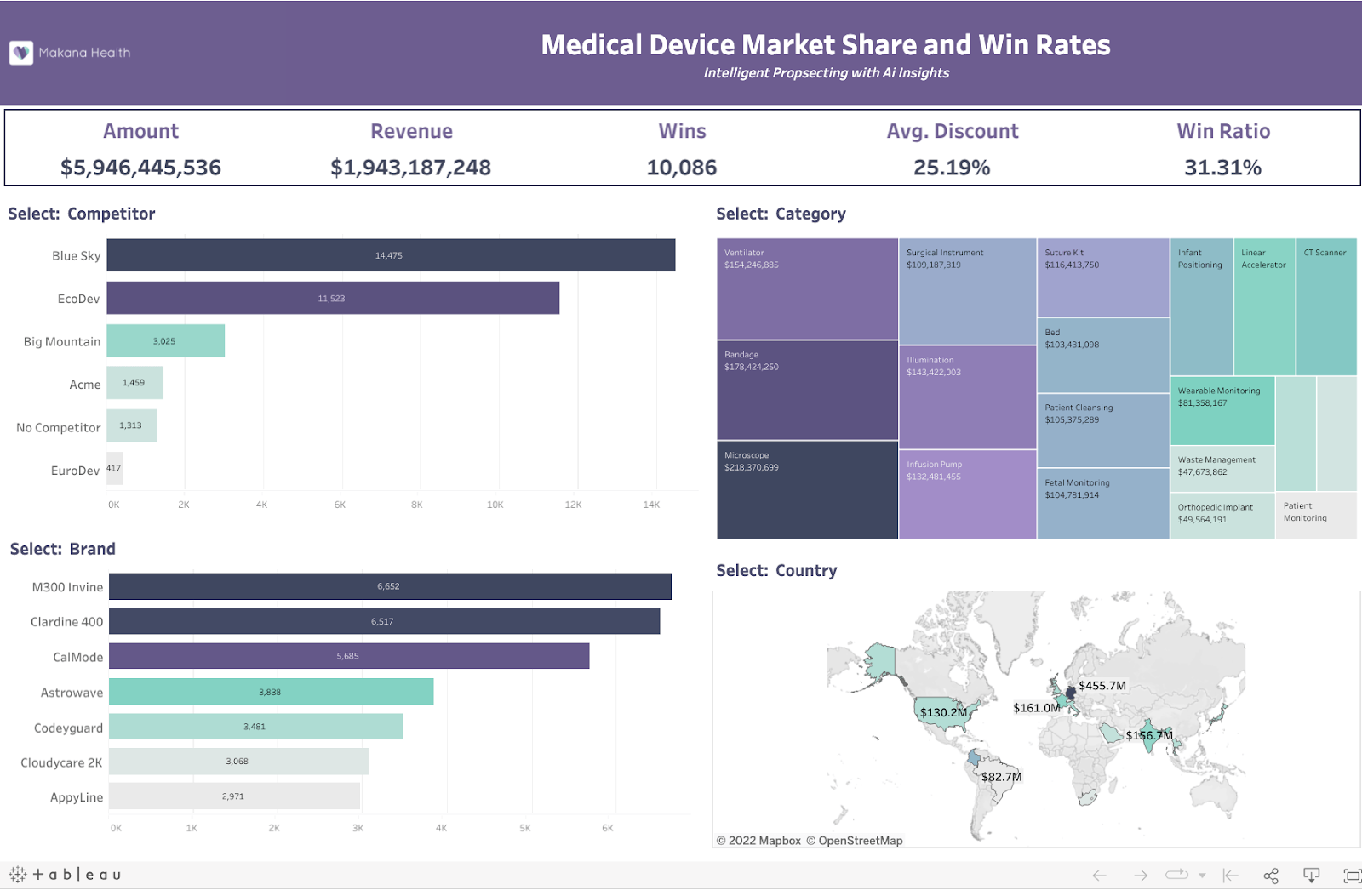
Tableau is one of the best business intelligence solutions within the healthcare sector. Notably, Tableau's adherence to HIPAA compliance safeguards sensitive patient information, aligning with the industry's stringent security and privacy standards.
Tableau interface is designed for ease of use, allowing for complex healthcare and marketing data to be navigated and analyzed effectively.
The platform supports real-time data analysis, which is crucial for making informed decisions quickly—a key aspect in improving marketing outcomes and streamlining operational efficiencies. Tableau’s capability to generate interactive dashboards provides a visual representation of data trends, patterns, and discrepancies, aiding in the identification of potential areas for improvement within patient care and operational workflows.
Scalability is another significant aspect of this healthcare BI software. Tableau accommodates the vast and varied data needs of healthcare organizations. This flexibility ensures that as an organization grows or its data analysis requirements become more complex, Tableau can continue to meet these needs without a decrease in performance.
How does Tableau handle HIPAA compliance.
Tableau ensures HIPAA compliance through several security features and best practices, which makes it a perfect BI solution for healthcare.
- Data encryption: Tableau provides robust encryption options for data at rest and in transit. This includes encrypting extracts and using HTTPS for secure data transmission to prevent unauthorized access.
- Audit trails: The platform offers comprehensive audit trail capabilities, allowing organizations to track user activities, data access, and changes within the system. This feature is essential for monitoring compliance with HIPAA regulations and for conducting security audits.
- Access controls and authentication: Tableau supports strong access control mechanisms, including integration with enterprise authentication systems like Active Directory. This ensures that only authorized users can access sensitive healthcare data, and it allows for the implementation of role-based access controls (RBAC) to limit users' access to the data they need for their specific roles.
- Compliance certifications and agreements: Beyond its built-in features, Tableau also aligns with broader compliance frameworks and can participate in Business Associate Agreements (BAAs).
- Secure deployment options: Tableau offers flexibility in deployment, including on-premises and cloud-based options, allowing organizations to choose the most secure and compliant environment for their data. For cloud deployments, Tableau ensures that its cloud services comply with HIPAA and other relevant security standards.
- Data de-identification: To further protect patient privacy, Tableau users can de-identify data, removing or encrypting personal identifiers to minimize the risk of privacy breaches. This practice is essential for using and sharing data responsibly within the healthcare BI tools.
2. Qlik
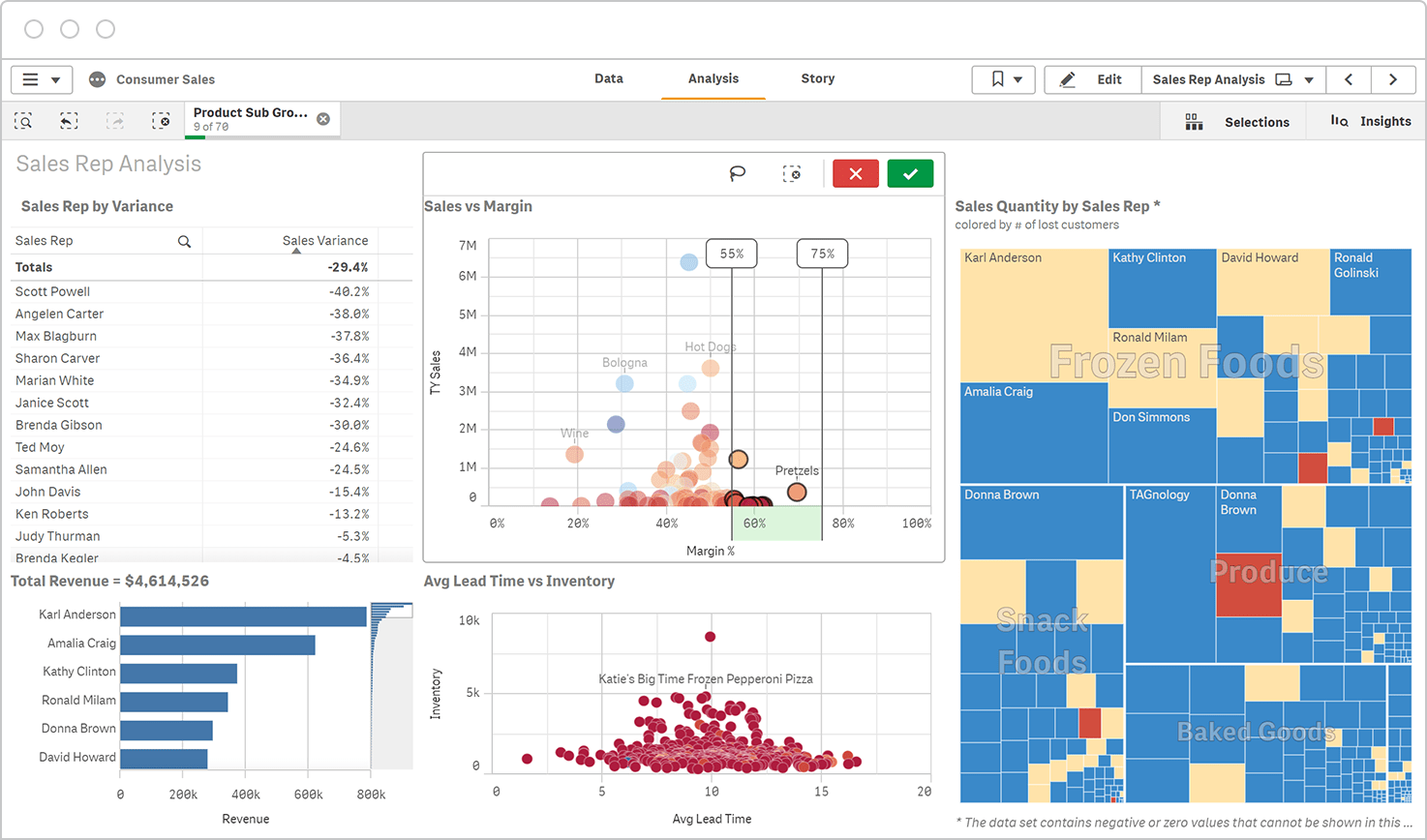
Qlik is another good choice for a healthcare BI solution. Qlik sets itself apart from other healthcare business intelligence platforms through its unique associative engine, which allows users to conduct in-depth analyses by intuitively exploring data connections across multiple sources instead of following predefined queries or linear exploration paths.
This capability enables healthcare organizations to uncover insights that might be overlooked by linear data exploration methods found in other BI tools. It offers a more holistic understanding of patient care, operational efficiencies, and marketing management.
Qlik promotes a self-service model, empowering non-technical users within healthcare organizations to create customized reports and dashboards. This democratization of data fosters a culture of informed decision-making, where insights are readily accessible to those who need them, from marketing analysts to decision-makers.
Moreover, Qlik's scalability caters to the growing data needs of healthcare enterprises, supporting them as they expand and adapt to new challenges. Its ability to integrate with multiple data sources and platforms ensures a cohesive and comprehensive view of information, critical for making strategic decisions in healthcare marketing and operations.
How does Qlik handle HIPAA compliance.
Qlik has a comprehensive set of security features to ensure adherence to HIPAA:
- Data encryption: Like Tableau, Qlik employs strong encryption methodologies for data both at rest and in transit.
- Audit trails: Qlik provides extensive audit trail functionalities, enabling healthcare organizations to monitor and record all user actions, data access, and system changes.
- Dynamic data masking: Qlik's dynamic data masking capabilities allow organizations to obfuscate sensitive information based on user roles and permissions. This ensures that users can only see data they are authorized to access, a critical feature for maintaining patient confidentiality and complying with HIPAA.
- Centralized management console: Qlik's centralized management console facilitates comprehensive oversight of security policies and user access across the platform. This allows healthcare organizations to enforce consistent security measures, manage encryption settings, and review access logs, all of which are essential for HIPAA compliance.
- Section access: This advanced security feature enables fine-grained control over data visibility at the row level, similar to user filters, but with more nuanced implementation options. Section access can be used to restrict data access based on user credentials.
3. Power BI
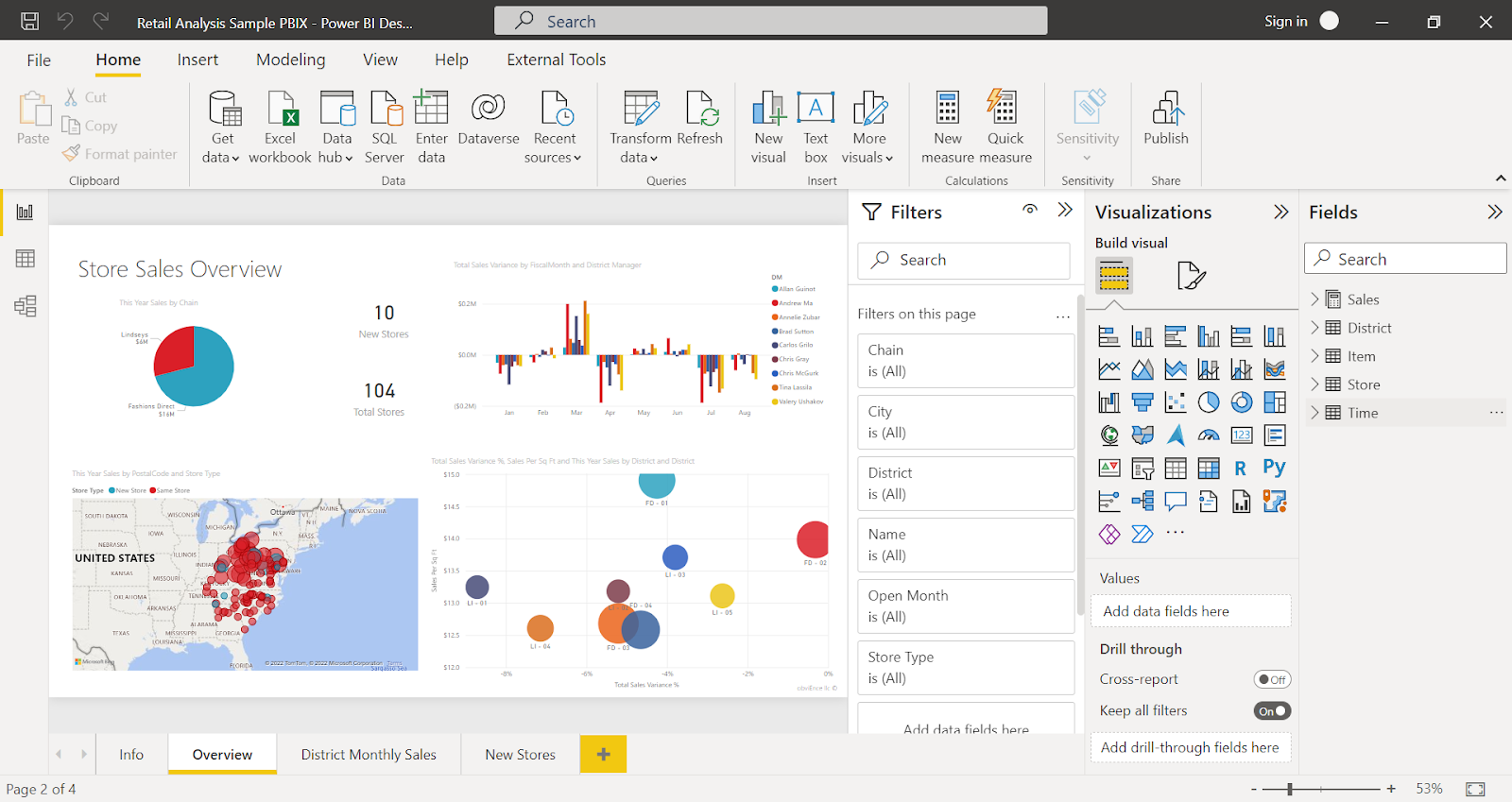
Power BI is a business intelligence solution with deep integration capabilities, intuitive design, and comprehensive analytics features tailored for the healthcare sector. Its ability to seamlessly connect with various data sources, including electronic health records (EHRs), financial systems, and patient feedback tools, enables healthcare organizations to consolidate disparate data for a unified view of operations, patient care, and marketing efforts.
Power BI offers a wide variety of visualization options, from basic charts to complex diagrams, all customizable to fit the brand and reporting needs of the enterprise. The drag-and-drop functionality makes it accessible for non-technical users, while still offering depth for those who wish to dive deeper.
With built-in AI and machine learning features, Power BI enables users to forecast trends, identify patterns, and uncover insights that can lead to improved marketing outcomes and operational enhancements. These predictive analytics capabilities are particularly valuable for tailoring healthcare services and optimizing resource allocation.
How does Power BI handle HIPAA compliance.
Power BI addresses HIPAA compliance through a series of dedicated security features and protocols:
- Data encryption: Similar to other healthcare BI solutions mentioned earlier, Power BI ensures the security of patients' data by employing strong encryption for data both at rest and in transit. For data at rest, Power BI uses Azure's encryption services, providing a high level of security for stored data. For data in transit, Power BI ensures secure communication channels through HTTPS, safeguarding data exchange and preventing unauthorized access.
- Data loss prevention (DLP) policies: Power BI integrates with Microsoft 365 compliance solutions, enabling organizations to apply Data Loss Prevention (DLP) policies directly within the Power BI environment. These policies help prevent the accidental sharing of sensitive information, including Protected Health Information (PHI), ensuring that data handling practices comply with HIPAA regulations.
- Conditional access policies: Leveraging Azure Active Directory, Power BI allows for the implementation of conditional access policies that provide an extra layer of security. These policies can restrict access to Power BI resources based on user location, device status, and other conditions.
- Secure sharing and collaboration: Power BI enhances HIPAA compliance by providing secure mechanisms for sharing reports and dashboards. With features like row-level security (RLS) and the ability to publish reports to Power BI Apps or workspaces with controlled access, organizations can share insights derived from PHI without exposing underlying data, aligning with HIPAA's requirements for safeguarding patient information.
4. Sisense
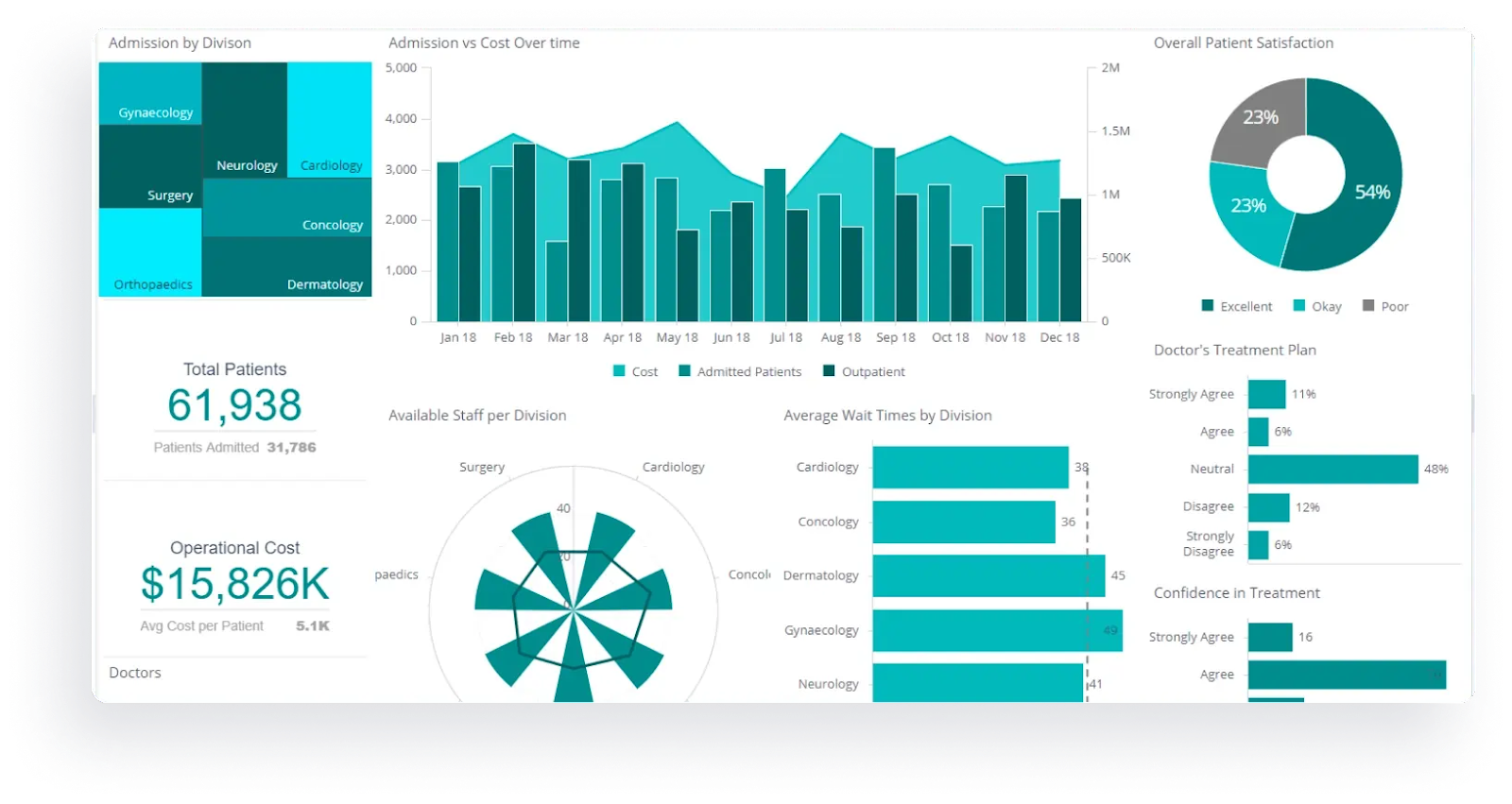
Sisense serves the healthcare industry by offering a suite of analytics and data visualization tools designed to handle the sector's unique challenges.
Sisense's strength lies in its highly customizable dashboards and data visualization tools, which allow healthcare analysts to tailor analytics to specific organizational needs. These features facilitate the monitoring of key performance indicators (KPIs), such as patient care quality metrics, operational efficiency, and financial performance, enabling quick identification of trends and areas for improvement.
Beyond static datasets, Sisense offers live data connectivity, enabling real-time data analytics. This feature is particularly beneficial for healthcare facilities needing up-to-the-minute information.
Sisense's Marketplace extends its functionality with a variety of pre-built add-ons and integrations, ranging from advanced visualization widgets to AI-powered analytics tools. Healthcare organizations can leverage these to enhance their analytics capabilities further, incorporating specialized tools like geospatial analysis for patient demographic studies or machine learning models for predicting patient readmission rates.
How does Sisense handle HIPAA compliance.
Sisense addresses HIPAA compliance through a multi-faceted approach to security and data protection, including:
- Data encryption: Similar to other healthcare business intelligence solutions, Sisense implements stringent encryption protocols for data both at rest and in transit. For data at rest, Sisense uses industry-standard encryption methods to secure databases and backups. Data in transit is protected using secure transport protocols, such as HTTPS, to ensure that any data moving between servers and clients is encrypted.
- Data governance and compliance monitoring: Sisense supports healthcare organizations in establishing a strong data governance framework. This includes tools and protocols for managing data throughout its lifecycle, ensuring data integrity, and monitoring compliance with internal policies and external regulations like HIPAA.
- Dedicated support for HIPAA compliance: Sisense offers specialized support to its healthcare clients to navigate the complexities of HIPAA compliance. This includes providing guidance on best practices for configuring the Sisense platform in a compliant manner, as well as offering resources and documentation that help organizations understand how to use Sisense safely within a regulated healthcare environment.
- Comprehensive data masking: Sisense allows for sophisticated data masking techniques, which are critical when working with protected health information (PHI). This feature enables healthcare organizations to anonymize patient data, ensuring that personal identifiers are obscured or removed when presenting data in reports or dashboards.
5. Domo
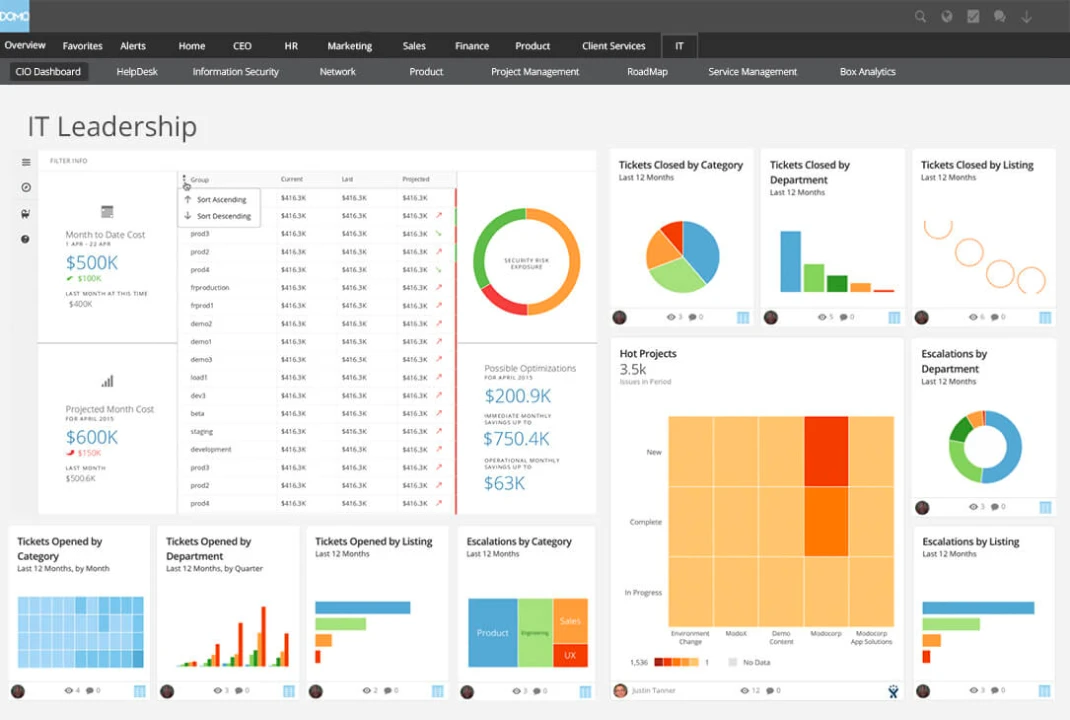
Domo is a versatile business intelligence platform that offers comprehensive solutions to the healthcare industry.
Domo's strength lies in its real-time data processing, allowing healthcare marketers to monitor campaigns and patient interactions as they happen. This immediacy helps in making agile marketing decisions, optimizing campaigns on the fly, and enhancing patient communication efforts with timely, relevant information.
With Domo, users can create dynamic, interactive dashboards to have visual representations of key performance indicators (KPIs), such as patient acquisition costs, conversion rates, and overall campaign ROI, facilitating data-driven strategy adjustments.
Similar to Sisense, Domo has a marketplace that offers pre-built apps and integrations, including healthcare-specific connectors that streamline data ingestion from electronic health records (EHRs), healthcare CRMs, and other industry-specific systems. This ecosystem enhances Domo's ability to provide tailored analytics solutions for healthcare marketing.
Beyond pre-built solutions, Domo empowers organizations to develop custom apps within its platform. This flexibility allows healthcare marketers to create bespoke solutions that address unique challenges, such as patient journey mapping or personalized healthcare campaign management.
How does Domo handle HIPAA compliance.
Domo's approach to HIPAA compliance incorporates a comprehensive array of security features and best practices:
- Data encryption: Domo employs advanced encryption for data both at rest and in transit. Utilizing AES-256 encryption for stored data and TLS protocols for data being transmitted, Domo ensures a high level of security against unauthorized access.
- Audit trails: The platform maintains detailed audit trails, recording every user action, data query, and system change. These logs are critical for monitoring compliance and facilitating the investigation of any potential HIPAA violations.
- Access controls: Domo implements strict access controls, requiring authentication and authorization for system access. Role-based access controls (RBAC) further ensure that users can only interact with data necessary for their roles, aligning with the minimum necessary use principle of HIPAA.
- User authentication: Incorporating strong user authentication mechanisms, including multi-factor authentication (MFA), Domo adds a layer of security to verify the identity of each user attempting to access the system.
- Data masking and anonymization: The platform supports data masking and anonymization techniques, crucial for de-identifying PHI to use in analytics without compromising patient privacy.
- Secure APIs: Domo's APIs are designed with security in mind, ensuring that any data exchange between Domo and other healthcare systems is conducted securely, maintaining the integrity and confidentiality of PHI.
- Incident response and breach notification: Domo has established a comprehensive incident response plan, including prompt breach notification procedures.
Comparison of Leading Healthcare BI Platforms
Selecting a platform requires comparing them across key dimensions. This table provides a high-level overview of how the top healthcare BI tools stack up in areas crucial for healthcare providers.
| Feature | Tableau | Power BI | Qlik | Sisense | Domo |
|---|---|---|---|---|---|
| HIPAA Compliance Features | Strong encryption, audit trails, granular access control. BAA available. | Managed via Microsoft 365 Compliance Center. Strong governance. BAA available. | End-to-end encryption, customizable security rules, governance dashboard. BAA available. | Multi-layered security, SSO, row-level security. BAA available. | Domo Trust program, strong encryption, and compliance certifications. BAA available. |
| Ease of Use | Highly intuitive drag-and-drop interface. Excellent for non-technical users. | Familiar Microsoft interface. Easy to start but steeper learning curve for advanced features. | Steeper learning curve due to associative model, but powerful once mastered. | Relatively easy for dashboard creation. Data prep can be more complex. | User-friendly interface focused on business users and collaboration. |
| Data Connectivity | Excellent. Connects to a wide range of on-prem and cloud data sources. | Excellent, especially within the Microsoft ecosystem (Azure, SQL Server). | Very good. Connects to many enterprise and cloud data sources. | Strong. Handles large, disparate data sources with ElastiCube technology. | Exceptional. Over 1,000 pre-built connectors simplify data integration. |
| AI and ML Capabilities | Ask Data natural language query, predictive functions, and clustering. | Integrated Azure ML features, smart narratives, and anomaly detection. | Cognitive Engine for insight suggestions and natural language interaction. | BloX and AI-driven forecasting and trend identification. | Mr. Roboto AI engine for predictive alerts and automated insights. |
| Real-Time Analytics | Supports live connections, performance depends on database. | Real-time streaming datasets and live connections. | Near real-time data indexing for fast exploration. | Live data connectivity for up-to-the-minute dashboards. | Designed for real-time data processing and updates. |
| Best For | Self-service visual analytics and data storytelling. | Organizations invested in the Microsoft ecosystem seeking scalable and affordable BI. | Deep data exploration and uncovering relationships in complex datasets. | Embedding analytics into custom applications and large-scale data handling. | Real-time business monitoring and company-wide data collaboration. |
Implementing a Business Intelligence Solution in Your Healthcare Organization
Implementing BI in healthcare is not a software rollout. It is the construction of a new decision-making layer across clinical, operational, and financial systems. Success depends on governance, workflow alignment, and trust in data. Technology is only one component.
A structured implementation approach prevents stalled projects and ensures early operational impact.
Step 1: Define Strategic Outcomes and Decision Questions
Healthcare BI should start with decisions, not dashboards. Identify where lack of visibility creates risk or inefficiency. Common starting points include readmission reduction, surgical throughput, appointment no-show rates, claim denials, or patient satisfaction gaps.
Translate these priorities into measurable KPIs and decision questions. For example: Where are discharge delays occurring? Which service lines drive negative margin? Which outreach programs improve appointment adherence? Clear questions guide data modeling and dashboard design.
Step 2: Align Clinical, Operational, and IT Stakeholders
Healthcare BI affects multiple domains. Clinical teams care about quality and safety. Operations care about capacity and throughput. Finance cares about cost and reimbursement. IT cares about security and integration.
Early alignment ensures the BI layer reflects real workflows and avoids building analytics that no one uses. Governance committees, data ownership models, and access policies should be defined before technical buildout begins.
Step 3: Select BI and Data Integration Infrastructure
Visualization tools alone do not solve healthcare analytics. A BI front end must be paired with a secure data integration and governance layer. This layer ingests EHR data, scheduling systems, billing platforms, patient engagement tools, and marketing systems into a unified model.
Integration infrastructure must handle identity mapping, data standardization, and audit controls. Without this foundation, dashboards inherit inconsistent definitions and compliance risk.
Step 4: Build Secure and Compliant Data Pipelines
Healthcare data pipelines must meet HIPAA and internal security requirements. Data extraction, transformation, and loading processes should include encryption, access controls, audit logs, and role-based permissions.
Pipelines must also be resilient. Failed data refreshes, broken interfaces, or delayed feeds directly impact clinical and operational decision-making. Reliability is a patient care issue, not only a technical concern.
Step 5: Deploy High-Impact Operational Dashboards First
Initial dashboards should target high-visibility use cases. Examples include real-time bed occupancy, operating room utilization, claim denial trends, or appointment adherence rates.
Early wins demonstrate trust in the data and prove value to clinical and administrative teams. Feedback loops refine visualization design and data definitions before expanding to more advanced analytics.
Step 6: Enable Adoption Through Embedded Analytics
Training is necessary but not sufficient. BI tools must fit into existing workflows. Clinicians need quick, role-specific views. Administrators need summary performance indicators. Executives need system-wide trend visibility.
Embedding dashboards into daily routines and decision meetings turns BI from a reporting layer into an operational standard.
The Role of Data Integration in Healthcare BI Success
Business Intelligence in healthcare fails without integrated data. Clinical, operational, financial, and engagement systems generate critical signals, but they rarely share structures, identifiers, or access rules. Until these systems are connected, analytics remains partial and decision-making stays reactive.
Data integration is the foundation that determines whether performance, outcomes, and efficiency can be measured at all.
Challenges of Disparate Data Systems
Healthcare organizations operate dozens of specialized platforms. Each system uses different data formats, patient identifiers, and update cycles.
This fragmentation makes it difficult to trace patient journeys from outreach to appointment to treatment to outcome. Manual reconciliation introduces delays and increases the risk of data handling errors. Privacy and HIPAA requirements add another layer of complexity, limiting how data can be moved and accessed.
Why a Data Integration Platform Is Essential
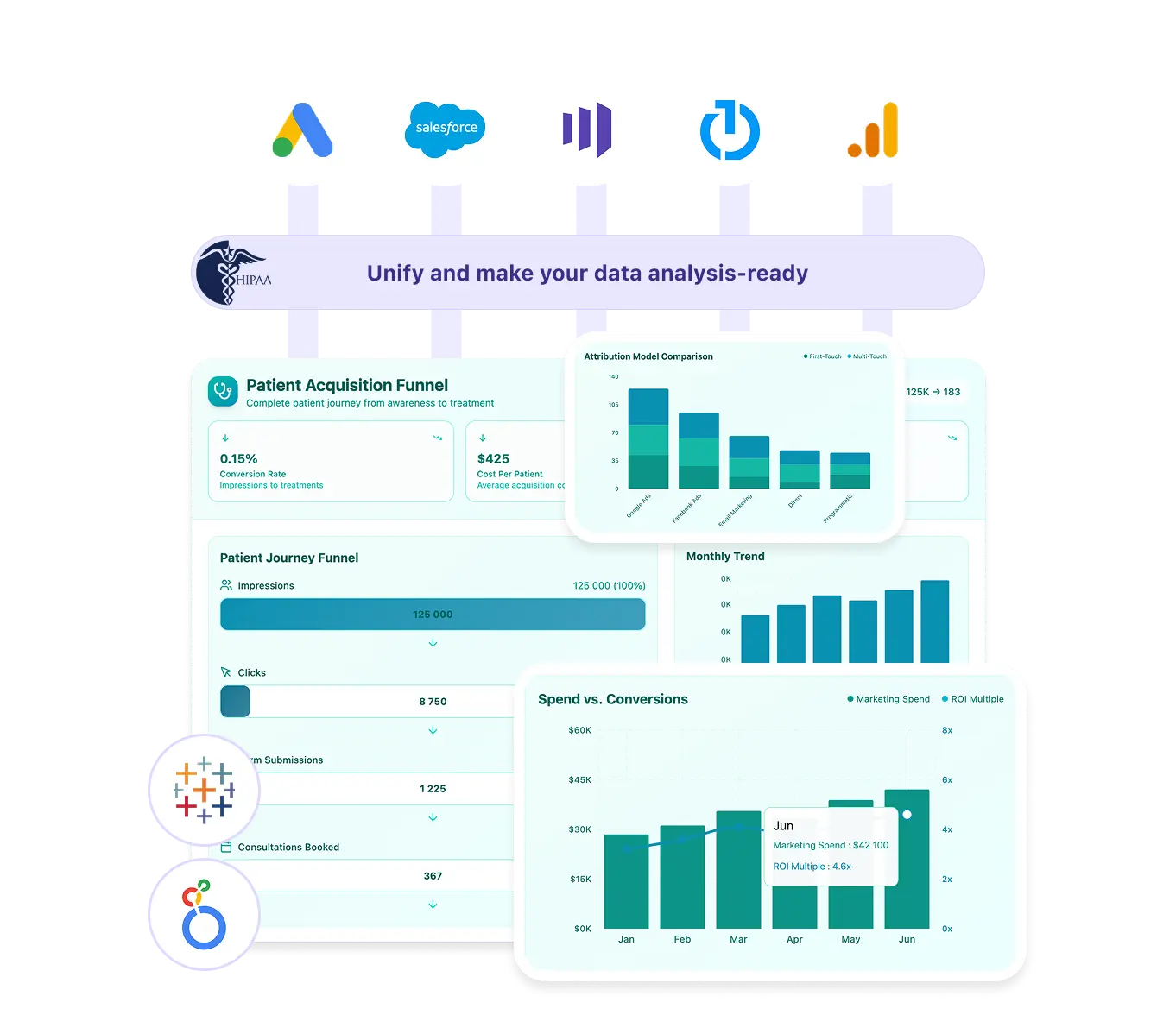
A data integration platform acts as the translation and governance layer between healthcare systems. It automates extraction from source systems, standardizes schemas, aligns identifiers, and applies validation rules before data reaches analytics environments.
Improvado provides this integration layer for healthcare BI. It connects to clinical, operational, marketing, and revenue systems, automates data ingestion, and enforces consistent metric and event definitions. Governance rules ensure that data entering dashboards and AI models meets quality and compliance requirements.
This removes manual data preparation work and ensures analytics teams operate on trusted, current data rather than stitched-together reports.
The Importance of a Centralized Data Warehouse
Healthcare BI requires a single, secure environment where integrated data can be analyzed without exposing protected health information unnecessarily. A centralized data warehouse serves as this controlled analytics layer.
Improvado delivers analysis-ready datasets into secure data warehouse environments and BI tools. Standardized models allow clinical leaders, operations teams, and executives to view consistent performance metrics across departments. When every team works from the same governed dataset, performance discussions shift from debating numbers to improving outcomes.
Automating Data Pipelines for Clean, Reliable Data
ETL pipelines in healthcare must be reliable, auditable, and secure. Failed refreshes or broken integrations directly affect patient care decisions and operational planning. Manual ETL processes do not scale with growing data volumes and regulatory requirements.
Improvado automates these pipelines with scheduled API ingestion, transformation logic, identity mapping, and continuous data quality monitoring. AI Agent can further configure extraction and transformation workflows using natural-language instructions, reducing dependency on technical scripting.
The result is clean, continuously updated data that supports real-time dashboards, predictive models, and outcome-focused BI without manual intervention.
Advanced Analytics: The Future of Healthcare Intelligence
Healthcare BI is moving beyond retrospective analysis. The next stage is advanced analytics, where systems anticipate risk, guide intervention, and recommend action. The objective is not to produce more reports. It is to reduce uncertainty in clinical and operational decision-making.
Advanced analytics shifts healthcare from reactive care management to proactive system control.
Predictive Analytics for Patient Risk Stratification
Predictive models analyze clinical history, utilization patterns, lab results, medication adherence, and engagement behavior to forecast risk. Common use cases include identifying patients likely to be readmitted, deteriorate during hospitalization, or miss follow-up care.
Risk scores are generated continuously and updated as new data arrives. Care teams can prioritize outreach, adjust discharge planning, or schedule additional monitoring. Resources are allocated based on predicted need rather than static rules.
This improves outcomes while reducing unnecessary utilization.
Prescriptive Analytics for Treatment and Care Pathways
Prescriptive analytics extends prediction into action guidance. Models compare a patient’s clinical profile against thousands of similar cases to estimate which interventions lead to better outcomes.
Recommendations may include alternative treatment pathways, adjusted medication plans, or personalized care schedules. These suggestions support clinicians with data-backed options, not automated decisions. Final judgment remains with care providers.
The result is more consistent, evidence-informed care delivery at scale.
The Role of Machine Learning and AI in BI
Machine learning and AI enable healthcare BI to operate on complex, high-dimensional data. They detect non-obvious patterns across diagnoses, procedures, medications, social determinants, and operational variables.
Modern BI platforms embed these capabilities into everyday workflows. Anomaly detection flags unexpected outcome shifts. Natural-language interfaces allow non-technical users to explore data. Automated insight engines surface trends without manual query building.
AI does not replace clinical or operational expertise. It amplifies it by shortening the path from data to decision.
Overcoming Common Challenges in Healthcare BI Adoption
Healthcare BI projects rarely fail because of visualization tools. They fail because of data trust, workflow friction, and organizational readiness. Recognizing these challenges early prevents stalled implementations and unused dashboards.
Data Quality and Integrity Issues
Analytics only works when data is reliable. In healthcare, source systems often contain inconsistent coding, missing fields, duplicate patient records, and misaligned timestamps. When this data flows into BI without governance, insights become misleading and trust erodes quickly.
Effective BI programs establish automated data validation, standardized definitions, and continuous quality monitoring. Platforms like Improvado support this by enforcing transformation and governance rules before data enters analytics environments. This ensures dashboards and AI models operate on verified, consistent information rather than manual reconciliations.
Data quality is not a one-time cleanup task. It is an ongoing operational discipline.
Limited Analytics Capacity
Healthcare organizations face persistent shortages of analytics talent. Building custom queries, maintaining pipelines, and designing dashboards often bottleneck progress. This limits how widely data can be used across clinical and administrative teams.
Modern BI environments reduce dependency on specialized analysts. Natural-language querying, AI-driven insight generation, and pre-built healthcare data models allow non-technical users to explore performance safely. This expands data access while keeping governance intact.
The goal is not to replace analysts. It is to reserve their time for advanced modeling rather than report building.
Resistance to Change and Low User Adoption
BI tools fail when they sit outside daily workflows. Clinicians and administrators will not adopt dashboards they do not trust or cannot access easily. Adoption requires visible data reliability and immediate operational relevance.
Successful implementations embed BI into existing decision routines. Real-time operational dashboards, automated alerts, and role-specific views make data part of everyday action. Executive sponsorship and continuous training reinforce usage, but trust in data quality remains the core adoption driver.
In healthcare, BI adoption is achieved when data stops being a reporting asset and becomes a shared clinical and operational language.
Measuring the ROI of Your Healthcare Business Intelligence Investment
A BI investment must demonstrate a clear return. Tracking specific metrics is essential to justify the cost and prove the value of your data analytics program to leadership.
Tracking Reductions in Readmission Rates
Hospital readmissions are costly and are often tied to quality of care. By using BI to identify at-risk patients and intervene, you can directly measure the reduction in readmission rates. This provides a clear, financially impactful metric for ROI.
Calculating Improvements in Operational Efficiency
Efficiency gains can be quantified. For example, you can calculate the financial impact of reducing the average length of stay or increasing operating room utilization. These operational improvements translate directly to the bottom line.
The Value of automated reporting and Time Savings
Don't underestimate the value of time. Calculate the hours your staff previously spent on manual data collection and reporting. Automating these tasks frees them up for higher-value activities like data analysis and strategic planning. This "soft" ROI is a significant benefit.
Insightful Visualizations Start with Clear Data
Each of these healthcare business intelligence platforms will simplify complex data analysis and make discovering insights easier.
When making a decision, consider factors like company size, budget constraints, specific use cases, and the data analysis experience within your team.
But don't forget that business intelligence and data visualization start with making sure your data is well-organized and of high quality. That's where tools like Improvado step in.
Improvado is a HIPAA-compliant marketing analytics solution that automates data aggregation from over 500 marketing and sales sources, streamlines data preparation, and seamlessly integrates with any BI solution mentioned on the list.
Get a demo call to learn more about Improvado and how it can simplify business intelligence at an enterprise level.
.png)



.png)
